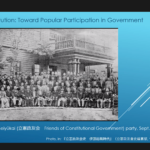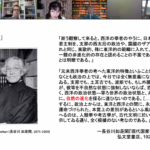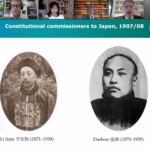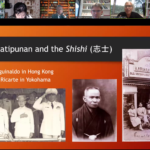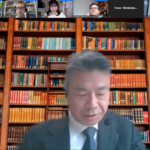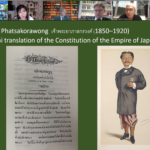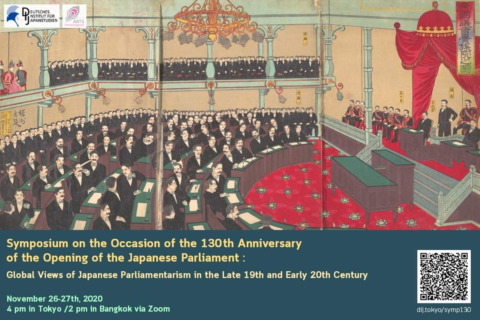
Veranstaltungsort
online (Zoom)
Co-organizer

Faculty of Arts, Chulalongkorn University, Bangkok
Anmeldung
Please consult the Instructions and Netiquette (PDF) before joining this online event.
Registration Form
We are sorry! Registration for this event is no longer possible.
Please subscribe to our DIJ Newsletter to stay informed about our research activities, events, and publications:
Symposium on the Occasion of the 130th Anniversary of the Opening of the Japanese Parliament
Global Views of Japanese Parliamentarism in the Late 19th and Early 20th Centuries
26. November - 27. November 2020
On November 29, 1890, the parliament of the Empire of Japan, the Imperial Diet, met for the first time marking the beginning of parliamentary government not only in Japan but in Asia. However, while the recognition of Japan as a role model for successful ‚modernization‘ of a non-Western society in the wake of the Russo-Japanese War has received much scholarly attention, the transnational appeal of this successful establishment of representative governance in Japan has not yet received much interest.
The German Institute for Japanese Studies, Tokyo, and the Faculty of Arts, Chulalongkorn University, Bangkok, took the occasion of this year’s 130th anniversary of the opening of the Imperial Japanese Diet as an opportunity to hold a symposium to discuss the global appeal of this first functioning constitutional government in Asia and beyond.
Programme:
Day 1, 26 November 2020, 16.00–19.30 (Tokyo)
16:00-16:10:
Technical Remarks by Sonja Ganseforth, DIJ
Opening remarks by Franz Waldenberger, DIJ
Opening remarks by David M. Malitz, Chulalongkorn University
16.10-16:50:
Keynote address by Kazuhiro Takii, Deputy-Director of the International Research Center for Japanese Studies, Kyoto. Followed by Q&A.
Summary
There is little interest in Japan to celebrate 130 anniversary of the opening of the Japanese Diet, as the former Imperial Diet and Constitution has been regarded as wrong institutions which led the nation to the militarism. We must, however, reconsider the continuity and discontinuity between the past and the present constitutional systems to contribute to the international debate on the virtue of the constitutionalism.
16:50-17:00: Break.
17:00-17:25: Yufei Zhou, DIJ: “The Concept of ‘Oriental Despotism’ in Modern Japanese Political Philosophy”. Followed by Q&A.
First panel ‚The transnational reception of the Imperial Japanese Diet and Japanese constitutional governance in Asia‘
17:25-17:30: Technical remarks and introduction by Sonja Ganseforth, DIJ
17:30-17:55: Egas Moniz-Bandeira, Max Planck Institute for European Legal History, Frankfurt: „‚Using the people’s power to depose despotic officials‘: Qing interpretations of the Meiji parliament“. Followed by Q&A.
Summary
For the Qing government, the Meiji parliament was the capstone of a thorough rebuilding of the state. It was attractive because it was perceived to strengthen the bond between government & people at the same time as it secured the monarch’s central position.
17:55-18:20: Karl Ian Chen Chua, Ateneo de Manila University, Manila: „Aspiring for Meiji Paradise: Philippine perceptions of the Meiji regime, Pan-Asianism, and Economic Migration“. Followed by Q&A.
Presentation Slides (PDF)
Summary
The Meiji Government was successful in propagating the myth of modernity. However, this monolithic Meiji myth had betrayed the Filipino revolutionaries, the male labor migrants and the karayuki-san through the policies it implemented concerning them.
18:20-18:45: David M. Malitz, Chulalongkorn University, Bangkok: „What is good about the Japanese system of governance? The reception of Imperial Japanese parliamentarism in Siamese/Thai political thought (1880s–1940s)“. Followed by Q&A.
Summary
The Imperial Japanese constitution and the Imperial Diet were constant reference points in Siamese political discourse. Prior to the 1932 revolution, critics of the absoluter monarchy referred to Japan when arguing for political change. After the revolution, conservatives discovered the imperial prerogatives in the Meiji constitution to argue for a higher status and for more political influence of the monarch.
18:45-18:55: Break.
18.55-19:30: Discussion.
Day 2, 27 November 2020, 16:00-18.30 (Tokyo)
Second panel: ‚The transnational reception of the Imperial Japanese Diet and Japanese constitutional governance beyond Asia‘
16:00-16:05: Technical remarks by Sonja Ganseforth, DIJ
16:05-16:10: Introduction by Milinda Banerjee, University of St Andrews.
16:10-16:35: Sara Marzagora, King’s College London: „Japan in Ethiopian political thought (1900s-1930s)“. Followed by Q&A.
Summary
The 1931 Ethiopian constitution was closely modelled on the Meiji one, allowing the Ethiopian elites to both abide by the Eurocentric definition of sovereignty in international law while also defending the modern political significance of the divinely-ordained monarchy.
16:35-17:00: Hussein Omar, University College of Dublin: „‚The Rising Sun‘: Egyptian nationalist Mustafa Kamil’s views of Japan“. Followed by Q&A. — cancelled —
17:00-17:25: Rafal Pankowski, Collegium Civitas, Warsaw: „Some remarks about the idea of ‚a second Japan‘ in 20th century Polish political thought“. Followed by Q&A.
Summary
The idea of ‘building a second Japan in Poland’ was proclaimed by Lech Walesa, the leader of the Solidarity movement, in the 1980s. The slogan might serve as an illustration of the attractiveness of the Japanese social, political and economic model in Poland throughout the 20th century.
17:25-17:35: Break.
17:35-18:15: Discussion.
18:15-18:30: Closing Remarks.

